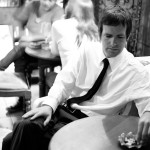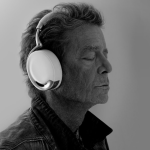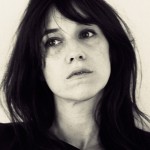
Photos by Travis Huggett
Words by Arye Dworken
When Erlend Øye and Eirik Glambeck Bøe released their debut record, 2001’s Quiet is the New Loud, they essentially set Kings of Convenience‘s mission statement in stone. While many musicians invest piles of money in manipulative guitar pedals and muscular amps, the Norwegian duo seeks a form of stark nakedness. This is why they’ve barely deviated from an acoustic malaise approach after three albums and nearly nine years. This is also why the pair’s latest LP, Declaration of Dependence, is perfect music for a miserable rainy day like today–a day that also happens to mark Øye and Bøe’s first U.S. show in four years.
We spoke to KoC the afternoon before their Bowery Ballroom gig, addressing their interest in samples, Stereolab and urban planning. Not to mention why it helps to be on a major label sometimes.
When was the last time you were both in New York?
Eirik: I was here a year ago, as a tourist with my brother.
Erlend: I was here four years ago.
Which is surprising because your other band, The Whitest Boy Alive, released two albums in that time span.
Erlend: You know how hard it is to get [to the U.S.]. It is really expensive and they make it very difficult. If the only thing you wanted was to get here and tour, that’s fine. But if you want to work here, perform, or do press, you have to go to Oslo and secure a visa–which is a drag. The Whitest Boy Alive didn’t have enough press clippings to get here, believe it or not. And we consciously did not want to do press for that band. That was part of our strategy. And so they said, if you don’t want to do press, people won’t know about you and come to your shows.
They determine whether you can come here on whether you have enough press or not?
Erlend: For sure. They determine from the press whether people want to come to your shows or not.
Eirik: Well, otherwise, then anyone can say they’re a band.
Everybody does say that, more or less these days. But you’re doing press now, and only one show–was it easy to get a visa?
Erlend: Kings of Convenience are on a major label technically. We’re under EMI which is a “corporation.â€
Two days in New York just to do press. You must love press.
[Laughs]
Eirik: I’ve spoken to journalists who know nothing about us and it’s not fun to talk to one like that. I’m not a salesperson. I don’t want to have to convince someone about our band, so it’s an inspiring conversation when we talk to someone who knows our music.
It’s been five years since the last album. That’s quite a gap. Erlend, you’ve been busy with collaborations and your band. What have you been up to, Eirik?
Eirik: It’s hard to answer what I’ve been doing for the last five years. My number one priority is this last record–I’ve spent a couple of years on Declaration.
It’s been my aim also to do things other than music. I need to do something concrete, like political activism, being involved in the world around me. Like urban planning in my hometown, in Bergen. I trained as a psychologist, but I also studied architecture. Urban planning is a good mix of the academic world and the physical world, like actively doing the two things together. I’ve been involved in that field.
Did you ever feel pressure to record a record during this half-decade?
Erlend: The music industry is a sinking ship, so everyone is afraid to lose their jobs. No one really bothered us because they just wanted to focus on keeping their jobs. We had to call the label and tell them we wanted to record a record, like, “Hello, we need an A&R guy.”
“Why would you make music to blend in?”
– Eirik Glambeck

Where did you record the album?
Eirik: In Italy, and in Norway.
Did the surroundings influence the record?
Erlend: I don’t believe in the surroundings influencing your ideas. The art is in your brain. And besides, you’re sitting in a studio with no windows most of the time.
As a duo, do you come together with ideas, or generally start from scratch and collaborate?
Erlend: We never start from scratch. You can’t write a good song when you expect something to happen miraculously. It has to happen leisurely on your own time.
Eirik: A lot of my songs are private so they had to begin in private.
Eirik: As you grow mature as a songwriter, you get more personal in your songs. But that happened on this record where we helped each other finish ideas or sentences.
My first exposure to your music was when your first album was released on Kindercore, and one of my favorite songs “Toxic Girl”:
Eirik [to Erlend]: You know, I recently met the guy who is in that song:
“She’ll talk to you when no one else is around:?â€
Erlend: Yes, that guy. He’s the “you.†I met him at a playground with his kid.
What’s the scene like in Bergen?
Erlend: The music scene is pretty small in the same way Austin and Athens are small. But yes, in some ways, it’s a scene. Like we opened for Frederik’s (Saroea, a co-founder of Datarock) band way back, I think, in 1993. He was quite good early on but he could never finish anything. Years later, when I stopped thinking about him as a successful musician, Datarock came out of nowhere and now, he’s everywhere.
But Norway is a vibrant scene in the way that a lot of people are inside making music by themselves. No one is walking down the street high-fiving one another.
Erlend, you were on the first Röyksopp record (2001’s Melody A.M.). Were you surprised at how popular it became–I think it sold millions of copies?
Erlend: Not really. I knew it was a great record. Røyksopp was a very unique band. They did music that no one else did, but they’re doing music closer to other electronic musicians. Like that Robyn song from this year (“The Robot And The Girlâ€) is too similar to a Kleerup song. It’s losing the distinctiveness.
Eirik: I’m a bit confused by what they’re doing now because like Erlend says, they were so different. Why would you make music to blend in?
Have you ever considered leaving Bergen if it’s so small?
Erlend: Oh yes. I always wanted to leave but being in a band and going on tour satisfied that urge. And it turns out that Bergen is a great place to come back home to. There’s still plenty of raging going on.
Eirik: I love the feeling of desperation that you can only feel in a small town like Bergen. The world feels so far away when you’re there. There’s such a desperate energy there, but there are also sudden bursts of energy, of joy, which I feel every once in awhile. And it’s a feeling on intimacy that I haven’t really felt elsewhere. It doesn’t happen too often–most of the time Bergen is pretty depressing. [Laughs] But those moments of magic:
Kings of Convenience has a specific aesthetic. There isn’t much deviation from the sparseness of your sound. Have you ever had a conversation about trying something random:
Eirik: I think when we were younger we were confused. We thought about being a rock band, but we bought into this philosophy that quiet is the new loud. We decided what to do and what not to do. It was never an issue to change the formula.
Erlend: Of course I could imagine how cool it would be to have an orchestra on one side, and a choir on the other side, but what we do–the two of us–is quite unique. We’re two acoustic musicians not influenced by acoustic music.
Eirik: But then there’s emotional pornography. With some singer/songwriters, there’s too much emotion, too much revealing. I think we withhold our emotions. I try to inject some cynicism to balance out. So there’s nakedness in the sound but the lyrics will trick you.
So, these Simon and Garfunkel and Nick Drake references:
Erlend: Our music has a lot to do with pop music of the ‘90’s. Our songs in their purest form share the structure of a classic 90’s pop song:how long to the chorus? How long is it until the verse? But we’re also influenced by looped music, samples. Listen to our songs and you’ll hear the guitars are repetitive and almost looping. But a band like Stereolab has also been very inspiring. I hope that people hear that.
Stereolab never got their proper due.
Erlend: I feel like that’s our destiny as well. Because they never played the game. Look at our release schedule–we’re not playing the game either. [Laughs]


